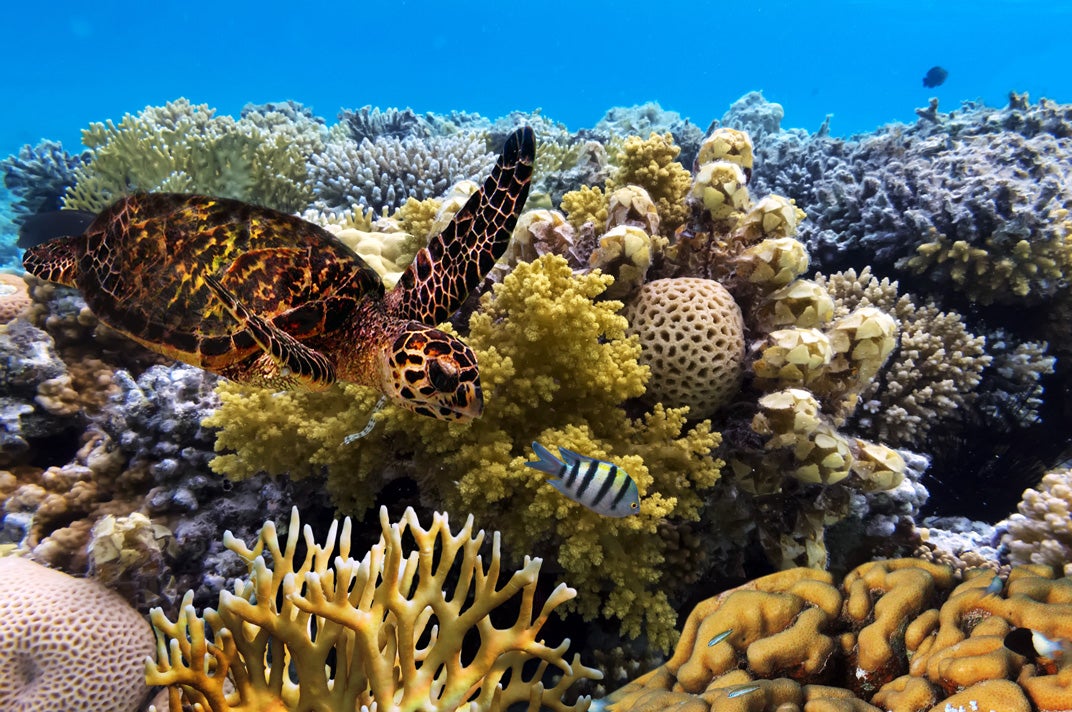With the Great Barrier Reef on the Brink, Australia’s Climate Policy is Adrift at Sea
The World Heritage Committee should encourage Australia to take meaningful action to protect this ocean treasure.
Oceans are essential to human life. Not only do billions of people depend on them for food and livelihoods, they are our first line of defense against climate change, absorbing carbon dioxide and excess heat. But the impacts of climate change are pushing one of the world’s most emblematic ocean sites, the Great Barrier Reef, to the brink. In just five years, it has suffered three mass coral bleaching events caused by elevated sea temperatures driven by climate change. Without a substantial reduction in global greenhouse gas emissions, the Great Barrier Reef as we know it today will not survive.
No single country can solve the climate crisis, but there are international treaties and institutions that can help. In partnership with Environmental Justice Australia, Earthjustice recently released a report calling on one of these bodies to take action. (Update, March 2021: Read the updated report, “The Australian Climate Crisis and the Great Barrier Reef World Heritage Area.”)
The World Heritage Convention, an international treaty under which the Great Barrier Reef is designated as a World Heritage site, imposes a special responsibility on Australia, as custodian of the Reef, to do its utmost to protect and conserve the site. To fulfil this obligation, Australia must reduce its contributions to climate change and align its actions with a global pathway that would limit warming to well-below 1.5°C, the upper limit of warming at which the Reef is likely to survive in its current form.
Australia is failing to fulfil this obligation. Instead, its actions are locking in decades of greenhouse gas emissions and fueling the climate change that is exacerbating the Great Barrier Reef’s deterioration.
The World Heritage Committee, a body of government representatives responsible for the implementation of the Convention, has acknowledged the extreme threat that climate change poses to coral reefs. But it has succumbed to almost a decade of intense lobbying by Australia, ignoring calls by international and Australian environmental lawyers to hold Australia accountable for its climate inaction and refusing to put the Reef on the List of World Heritage in Danger. Australia even went so far as to pressure the authors of a 2016 United Nations report about the impacts of climate change on World Heritage sites to remove all references to the Reef and other Australian world heritage sites.
Australia’s lobbying efforts show that the country cares about the World Heritage Committee’s opinion. The committee should use this power to encourage Australia to do the right thing for the Reef and the climate.
In not calling Australia to account for its oversized contribution to the climate crisis, the World Heritage Committee is failing to join other international institutions using their influence to address climate change. For example, United Nations human rights committees, which administer human rights treaties, have expressed concern that Australia’s climate inaction is inconsistent with its international legal obligations to protect human rights. They have called on Australia to reduce its greenhouse gas emissions, phase out the production and export of fossil fuels, and accelerate the transition to clean energy.
Independent experts and the United Nations Environment Programme have also condemned Australia’s climate failures. Already one of the world’s largest exporters of coal and gas, Australia is determined to expand production and export, locking in emissions for decades to come. It is further eroding its international standing by proposing to use carryover credits from its inadequate Kyoto Protocol commitments to meet its emissions reductions targets under the Paris Agreement. The international community widely opposes Australia’s use of carryover credits because it undermines global action on climate change by substantially cutting Australia’s overall emissions reductions.
If Australia took strong climate action, it would become a moral leader able to influence other nations. Thus far, however, Australia has shown itself unable to take such action on its own initiative. The World Heritage Committee must therefore step into the gap and call Australia to account. Otherwise, there is a very real risk that we will lose the Great Barrier Reef and, with it, the hope for a safe climate future.
The International Program partners with organizations and communities around the world to establish, strengthen, and enforce national and international legal protections for the environment and public health.
Earthjustice Media Relations Team
media@earthjustice.org
